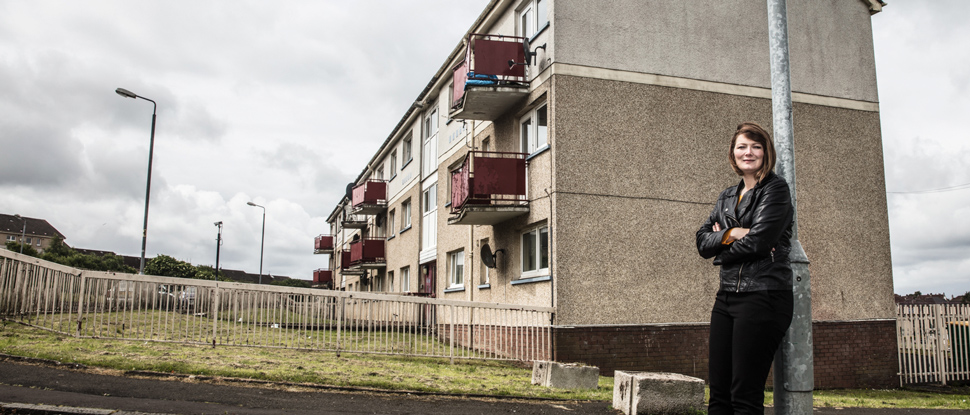- Home |
- Search Results |
- ‘Libraries protected me at my most vulnerable’: Kerry Hudson on why libraries can’t be lost
‘Libraries protected me at my most vulnerable’: Kerry Hudson on why libraries can’t be lost
Lowborn author Kerry Hudson is proudly working class, but she was never proudly poor. The poverty she grew up in was grinding and often dehumanising. She shares the vital role that libraries and books played in her life, and why we must do everything in our power to protect them.

It’s the same instant calm each time I go through the doors. More immediate than a glass of white wine on an empty stomach, better than a Xanax. But it’s deeper than that, it’s a feeling of safety that settles softly inside me. I’m talking about walking into a library. My whole life, whatever has been happening, wherever I’ve been in the world, I’ve walked into a library and, at least for that moment, everything has been OK.
'The library was magic, suspended from real life and people’s assumptions of how little I was worth.'
I’ve lost count of the writers who also credit libraries as the reason they are where they are now. Joanna Cannon, author of the Sunday Times bestselling debut novel The Trouble with Goats and Sheep told me, ‘Everything I have done, and everything I am, is down to that brown, cardboard library ticket.’ Award-winning Young Adult author, Juno Dawson, states that, ‘Bingley Library moulded me into a writer. Working class, transgender kids, statistically probably aren’t meant to end up where I have and that’s in part due to the social mobility libraries and reading allowed me.’
On Twitter I asked for stories from people from marginalised backgrounds who wouldn’t be doing what they now are without libraries. Over two hundred deeply moving stories flooded in. Each was unique but many aspects of the stories overlapped, circles within circles, a Venn diagram of the true significance of libraries. Stories came from those who were in care, those from chaotic, poor or abusive households, those who were bullied, those with disabilities or mental health problems, those who were LGBT, those who just needed a place they wouldn’t be turned away from. Though many said that without those loaned books they’d have remained near uneducated or would never have gone to university, many more told me libraries also offered them desperately needed escape, safety and possibility where none existed otherwise.
I wonder, with so many libraries under threat in the UK right now, what will happen to those children for whom libraries might have been their education, inspiration and safe space? What will happen to those kids who, like me long ago, might have used the library as the foundation of the good, purposeful lives they might build given the chance?
I truly believe that the access I had, wherever I was, no matter what stage in my life, saved my life. I would not be here without them. And no, that isn’t something that can be measured on a spreadsheet. It’s real human experience, it’s value still reaped decades later. I simply cannot understand how this national resource, one that is relatively inexpensive in the grand scheme of managing a country, could be considered superfluous. And I won’t sit back and just watch as it is purposefully and relentlessly dismantled.
'Libraries protected me at my most vulnerable and now I’ll try to do the same for them'
I spoke to Laura Swaffield at The Library Campaign who says things are far worse now than they were in 1984 when the Campaign was set up in response to Margaret Thatcher’s policies. I asked both Laura, Cat Dormer, of Supporters of Newarthill Library, and other activists what the public can do in the face of this. They all told me that, because of the way libraries are assessed, simply joining and using your library regularly is the best thing you can do. Here in Liverpool, I’m going to join my ‘friends of…’ group at my library and if there isn’t one I’m going to set one up. I’m also staying up to date with what’s happening on the excellent Public Library News and Library Campaign websites because, libraries taught me well, knowledge is power.
Author Damian Barr, who successfully campaigned twice with Cat and Supporters of Newarthill Library to halt the closure of his childhood library in Newarthill said, ‘For me the library was fundamentally a safe, warm space where no one was trying to hurt or bully me.’
This is not just Damian’s story, or mine, but the story of so many children today. Libraries protected me at my most vulnerable and now I’ll try to do the same for them.
Kerry Hudson is the author of Lowborn.